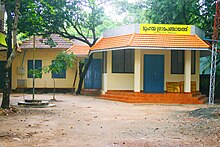
The Panchayat raj is a political system originating from the Indian subcontinent, primarily found in India and neighboring countries Pakistan, Bangladesh, Sri Lanka, and Nepal.[1] It is one of the oldest systems of local government in the Indian subcontinent, with historical mentions dating back to around 250 CE.[2] The word 'raj' means 'rule,' and panchayat' means 'assembly' (ayat) of 'five' (panch). Traditionally, panchayats consisted of wise and respected elders chosen and accepted by the local community. These assemblies resolved disputes between individuals and villages. However, there were various forms of such assemblies.
The leader of the panchayat was often called the president, mukhiya, sarpanch, or pradhan, which was an elected or generally acknowledged position. The modern panchayati raj system of India and its gram panchayats should not be confused with the traditional system or the extra-constitutional khap panchayats (or caste panchayats) found in parts of northern India.[3]

Mahatma Gandhi advocated for panchayat raj as the foundation of India's political system. It was envisioned as a decentralized form of government, where each village would be responsible for its own affairs.[4][5] This vision was termed Gram Swaraj ("village self-governance"). While India developed a highly centralized system of government,[6] this has been moderated by delegating several administrative functions to the local level, thereby empowering elected gram panchayats.[7]
Jawaharlal Nehru inaugurated the panchayati raj system at Nagaur on 2 October 1959. The date was chosen to coincide with Mahatma Gandhi's birthday. Gandhi envisioned Gram Swaraj through the panchayati raj system.[8][9] The system was later modified in 1992.[10]
- ^ Although it is also found in other places such as Trinidad and Tobago. "The Panchayat system as an early form of conflict resolution in Trinidad - GCSE History". www.markedbyteachers.com. "Carmona wants "Panchayat" system to resolve conflicts". Trinidad and Tobago Newsday. 30 May 2016. "Return of the panchayat". Trinidad and Tobago Newsday. 12 May 2005.
- ^ P.B. Udgaonkar (1986), Political Institutions & Administration, Motilal Banarasidass Publishers, 1986, ISBN 978-81-20-82087-6,
... these popular courts are first mentioned by Yajnavalkya and then by Narada, Brishaspati, Somadeva and Sukra. These writers covered a period of about a thousand years, c. 100 to 1950 A.D., and they could not have mechanically referred to the popular courts if they were not actually functioning ...
- ^ Mullick, Rohit & Raaj, Neelam (9 September 2007). "Panchayats turn into kangaroo courts". The Times of India.
- ^ Sisodia, R. S. (1971). "Gandhiji's Vision of Panchayati Raj". Panchayat Aur Insan. 3 (2): 9–10.
- ^ Sharma, Manohar Lal (1987). Gandhi and Democratic Decentralization in India. New Delhi: Deep and Deep Publications. OCLC 17678104. Hathi Trust copy, search only
- ^ Hardgrave, Robert L. & Kochanek, Stanley A. (2008). India: Government and Politics in a Developing Nation (seventh ed.). Boston, Massachusetts: Thomson/Wadsworth. p. 157. ISBN 978-0-495-00749-4.
- ^ Pellissery, S. (2007). "Do Multi-level Governance Meet Local Aspirations?". Asia Pacific Journal of Public Administration. 28 (1): 28–40.
- ^ Sharma, Shakuntla (1994). Grass Root Politics and Panchayati Raj. Deep & Deep Publications. p. 131.
- ^ Singh, Surat (2004). Decentralised Governance in India: Myth and Reality. Deep & Deep Publications. p. 74. ISBN 978-81-7629-577-2.
- ^ Singh, Vijandra (2003). "Chapter 5: Panchayate Raj and Gandhi". Panchayati Raj and Village Development: Volume 3, Perspectives on Panchayati Raj Administration. Studies in public administration. New Delhi: Sarup & Sons. pp. 84–90. ISBN 978-81-7625-392-5.